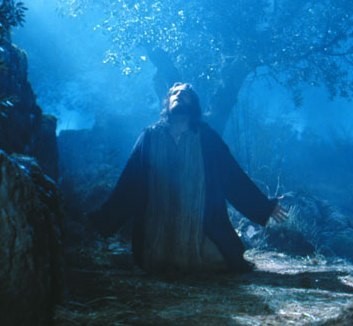Olive trees in the Garden of Gethsemane
Luke 22: 39 - 44 (NIV)
39 Jesus went out as usual to the Mount of Olives, and his disciples followed him. 40 On reaching the place, he said to them, “Pray that you will not fall into temptation.” 41 He withdrew about a stone’s throw beyond them, knelt down and prayed, 42 “Father, if you are willing, take this cup from me; yet not my will, but yours be done.” 43 An angel from heaven appeared to him and strengthened him. 44 And being in anguish, he prayed more earnestly, and his sweat was like drops of blood falling to the ground.
Matthew 26: 36 – 39 (NIV)
36 Then Jesus went with his disciples to a place called Gethsemane, and he said to them, “Sit here while I go over there and pray.” 37 He took Peter and the two sons of Zebedee along with him, and he began to be sorrowful and troubled. 38 Then he said to them, “My soul is overwhelmed with sorrow to the point of death. Stay here and keep watch with me.” 39 Going a little farther, he fell with his face to the ground and prayed, “My Father, if it is possible, may this cup be taken from me. Yet not as I will, but as you will.”
Mark 14: 32 – 36 (NIV)
32 They went to a place called Gethsemane, and Jesus said to his disciples, “Sit here while I pray.” 33 He took Peter, James, and John along with him, and he began to be deeply distressed and troubled. 34 “My soul is overwhelmed with sorrow to the point of death,” he said to them. “Stay here and keep watch.” 35 Going a little farther, he fell to the ground and prayed that if possible, the hour might pass from him. 36 “Abba, Father,” he said, “everything is possible for you. Take this cup from me. Yet not what I will, but what you will.”
In Richard Foster’s book, Prayer, he writes about the Prayer of Relinquishment
(relinquishing our will to God’s will). The following is an excerpt from his
chapter on the Prayer of Relinquishment.
“The School of Gethsemane”
We learn the Prayer of Relinquishment in the school of Gethsemane. Gaze in adoring wonder at the scene. The solitary figure etched against gnarled olive trees. The bloodlike sweat falling to the ground. The human longing: “Let this cup pass.” The final relinquishment: “Not my will but yours be done.” We do well to meditate often on this unparalleled expression of relinquishment. Here we have the incarnate Son praying through his tears and not receiving what he asks. Jesus knew the burden of unanswered prayer. He really did want the cup to pass, and he asked that it would pass. “If you are willing” was his questioning, his wondering. The Father’s will was not yet absolutely clear to him. “Is there any other way?” “Can people be redeemed by some different means?” The answer—no! Andrew Murray writes, “For our sins, He suffered beneath the burden of that unanswered prayer.”
Here we have the complete laying down of human will. The battle cry for us is, “My will be done!” rather than, “Thy will be done!”. We have excellent reasons for the banner of self-will: “Better for me than them to be in control”; “Besides, I would use the power to such good ends.” But in the school of Gethsemane, we learn to distrust whatever is of our own mind, thought and will even though it is not directly sinful. Jesus shows us a more excellent way. The way of helplessness. The way of abandonment. The way of relinquishment. “My will be done” is conquered by “not my will.”
And this prayer is at the end of his chapter:
Oh, Lord, how do I let go when I'm so unsure of things? I'm unsure of your will, and I'm unsure of myself. … That really isn’t the problem at all, is it? The truth of the matter is I hate the very idea of letting go. I really want to be in control. No, I need to be in control. I am afraid to give up control. Heal my fear, Lord.
Richard Foster quotes Andrew Murray in his book:
The Spirit teach me to yield my will entirely to the will of the Father. He opens my ear to wait in great gentleness and teachableness of soul for what the Father has day by day to speak and to teach. He discovers to me how union with God’s will is union with God Himself; how entire surrender to God’s will is the Father’s claim, the Son’s example, and the true blessedness of the soul.
My prayer: Heavenly Father, help me to surrender to your will. Your will, not mine.
Jesus in the Garden (This is the same writer who wrote the cantata the choir sang a couple of years ago. It is very similar to the song in the cantata about Jesus in Gethsemane):


No comments:
Post a Comment